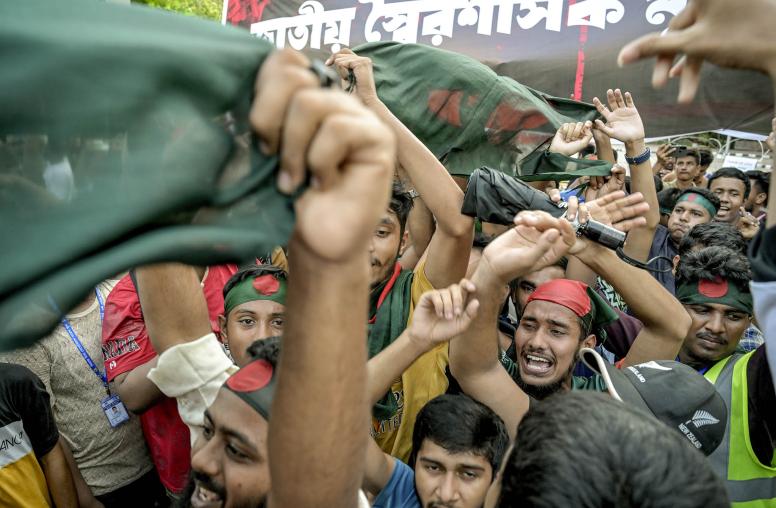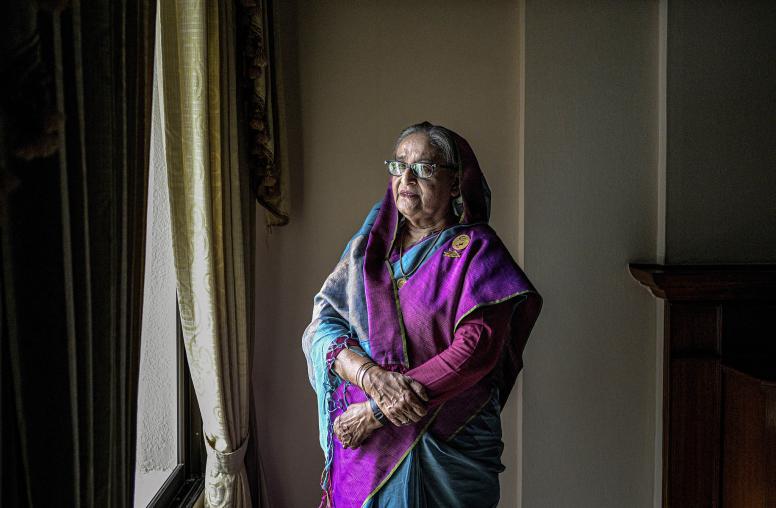Bangladesh: Human Rights and the Rule of Law in Crisis?
USIPeace Briefing analyzes the coexistence of Islam and democracy in Bangladesh.
Bangladesh has long been heralded as a moderate Muslim country that has encompassed diversity in belief and praxis of Islam. It has also made laudable strides in improving the availability of health services, expanding educational opportunities for its 144 million citizens, and has done much to empower women. Bangladesh, along with Turkey, exemplifies the coexistence of Islam and democracy.
Unfortunately, Bangladesh has entered a difficult phase. Since 1999, Islamist militants have unleashed a campaign of terror that has gone virtually unchecked. They have attacked opposition party members, authors, cultural assemblies, religious minorities, and even Muslims who prefer Bangladesh’s traditional Sufi variants of Islam. Many fear that the alliance of the ruling Bangladesh National Party (BNP) with two hard-line Islamist political parties has encouraged the spread of violence. Meanwhile, the government is in a state of paralysis, as both the ruling and opposition parties struggle for power at all cost.
Alarmist headlines have declared Bangladesh a “Cocoon of Terror” and the site of the next “Islamist Revolution.” How significant are these events and what risks do they really pose to human rights and rule of law in this important—if flawed—democracy? The U.S. Institute of Peace convened an expert panel to consider these issues and examine their significance. The panel included former American and Bangladeshi diplomats as well as current and former representatives of the U.S. Department of State. This Peace Briefing, prepared by Kerem Levitas and Christine Fair of the Institute of Peace, provides a summary of the issues, challenges, and policy options discussed at the meeting.
Bangladesh is an Important Democracy and U.S. Ally
All panelists agreed that Bangladesh is an important U.S. ally. With its 144 million inhabitants, Bangladesh is one of the most populous Muslim countries in the world. It won its independence from Pakistan in 1971 through an armed struggle that was based upon Bengali nationalism and an ethos that amalgamated religious tolerance and strands of socialism. While Bangladesh has had its experiences with military leadership, since 1991 it has held three mostly free and fair elections and boasts an involved electorate with massive election turnout.
All participants acknowledged Bangladesh’s extraordinary progress in human and economic development over a short period of time and with relatively few resources. It has achieved one of the fastest birth-rate reductions without the use of coercion. It has expanded life expectancy for both men and women and has achieved impressive results in expanding education and economic opportunities for its citizens.
Bangladesh has also proven to be a social and democratic entrepreneur. It has given the world the concept of micro-credit in the form of the Grameen bank and other micro-credit operations throughout the country. It has also made important contributions to the fight against child trafficking and child labor. Bangladesh has shown the world how a Muslim society can effectively deal with issues of gender discrimination. Women have led both the country and the two main parties for the past 14 years. In addition, large numbers of women sit on Bangladesh’s superior courts and have been instrumental in handing down judgments against the restrictive edicts of village council fatwas. To the lexicon of democracy, it has added the concept of the neutral caretaker transitional government.
Bangladesh is also a good international citizen. Currently, it is the second-largest contributor of troops to United Nations Peacekeeping Operations with some 4,500 soldiers in missions around the world.
Bangladesh’s Zero-Sum Political Culture Hinders Governance And Encourages Faustian Bargains
Bangladesh’s political system is dominated by two heritage parties, the ruling BNP and the opposition Awami League (AL). Panelists acknowledged with concern that both are bitter rivals and are obsessed with undercutting each other—at the expense of Bangladesh’s governance. Unlike India or other robust democracies, the opposition in Bangladesh has very little role to play in governance. This fact compels opposition parties to engage in practices that are inconsistent with democratic principles and practices, such as calling economically debilitating national strikes, violent street politics, and any other means to destabilize the government. This culture of zero-sum politics has resulted in a parliament that operates fitfully at best and has encouraged dangerous alliances.
One participant explained that in recent decades, both parties have made Faustian bargains with Islamist political parties to win a majority of seats in the parliament. For instance, the current BNP government has two such parties in its coalition, Jamaat Islami (JI) and Islamia Oikya Jote (IOJ). The JI was given two cabinet positions, including the sensitive and crucial social welfare portfolio. Panelists observed that Islamist parties have grown in influence and prestige and have emerged as kingmakers in Bangladeshi elections.
The Rise Of Political Islam And Islamist Violence: Crisis Or Challenge?
The speakers generally agreed that Bangladesh has not reached a state of crisis but they did express concern about recent events, including:
- Alliances with hard-line Islamists. Notably, the BNP’s senior partner, the JI, has expressed support for Islamic revolution, and the IOJ has expressed solidarity with the Taliban regime.
- The increasing prevalence of village councils (salish) issuing fatwas. These fatwas have been particularly harmful for women and have resulted in numerous women being stoned and whipped. These fatwas are often in defiance of Bangladesh jurisprudence. This had not deterred their proponents in government. In January 2002, in response to the courts striking down a fatwa, the leader of the JI proclaimed, “Courts won’t be allowed to control fatwas, instead fatwas would control the court.”
- The rise of new and less tolerant interpretations of Islam. This has been concomitant with the rise of political violence, perpetrated by thuggish groups operating as self-styled Islamist militias. At the same time, Bangladesh also has seen a rise in authoritarianism on the part of the ruling party. Opposition parties are branded “enemies of the state” and excluded from the state apparatus while the government increasingly relies on draconian methods to ensure law and order. While in power, both parties have taken steps to ensure that lower courts remain hostage to executive purview.
- The growing interplay between the rise of Islamism (with violent manifestations) and authoritarianism. This has precipitated assaults on nongovernmental organizations (NGOs) and social development projects. For Islamists, their aim is to reverse or curtail NGO efforts to improve the situation of Bangladeshi women, while the authoritarian element has allied with these interests for purely practical political advantage. Success would be a major setback for Bangladesh since, amid widespread government failure, the nongovernmental sector has stepped in to supply myriad services that an otherwise functional government would provide. Since 1971, NGOs have run schools, provided health care and human services to the nation and have been responsible for many of the human development milestones that have been achieved.
All panelists agreed that these issues merit concentrated attention. Unfortunately, policy measures to address these developments were more illusory.
The Way Forward…
All panelists agreed that the United States should vigorously encourage Bangladesh to address the issues of governance, law and order, and human rights and to diminish the influence of violent Islamists.
- The forthcoming election in 2006 will be an important litmus test. That election must be free and fair and it must be seen to be free and fair. The ruling party should be persuaded to include the opposition in the government. This may discourage them from engaging in more subversive activities.
- Bangladesh needs to better appreciate the value of justice and rule of law. While U.S. assistance in law enforcement and judicial reform is useful, ultimately it is the will of the government that matters: If the government wants to misuse security forces it will do so.
- Politicians in Bangladesh need to appreciate the value of civil society. Both the voting electorate and the international community must demand this.
- One panelist argued for economic support to Bangladesh’s garment suppliers. Due to a change in the garment quota regime (previously the Multifiber Agreement or MFA), some small garment producers closed down because they were unable to compete with less expensive suppliers. While the economic costs are large, he argued that the social and political consequences might be greater—particularly since women are the primary workers in the garment sector. However, others oppose such aid, arguing that Bangladesh knew for ten years that the MFA regime would end. Since then, it did little to stem the pervasive corruption, which drives up the cost of Bangladeshi garments. Proponents of this view contend that the free market—not subsidies—will provide Dhaka the incentives to become more competitive.
- Speakers reiterated the point that political deals with Islamist parties cater to their non-democratic agendas and contribute to the spread of violence. Unless parties can be persuaded to abandon this tactic, solutions to Bangladesh’s problems may be substantially more difficult to achieve.
This USIPeace Briefing was written by C. Christine Fair, Program Officer and Kerem Levitas, Program Assistant in the Research and Studies program at the Institute of Peace. The views expressed here are not necessarily those of the Institute, which does not advocate specific policies.
The United States Institute of Peace is an independent, nonpartisan institution established and funded by Congress. Its goals are to help prevent and resolve violent international conflicts, promote post-conflict stability and development, and increase conflict management capacity, tools, and intellectual capital worldwide. The Institute does this by empowering others with knowledge, skills, and resources, as well as by directly engaging in peacebuilding efforts around the globe



